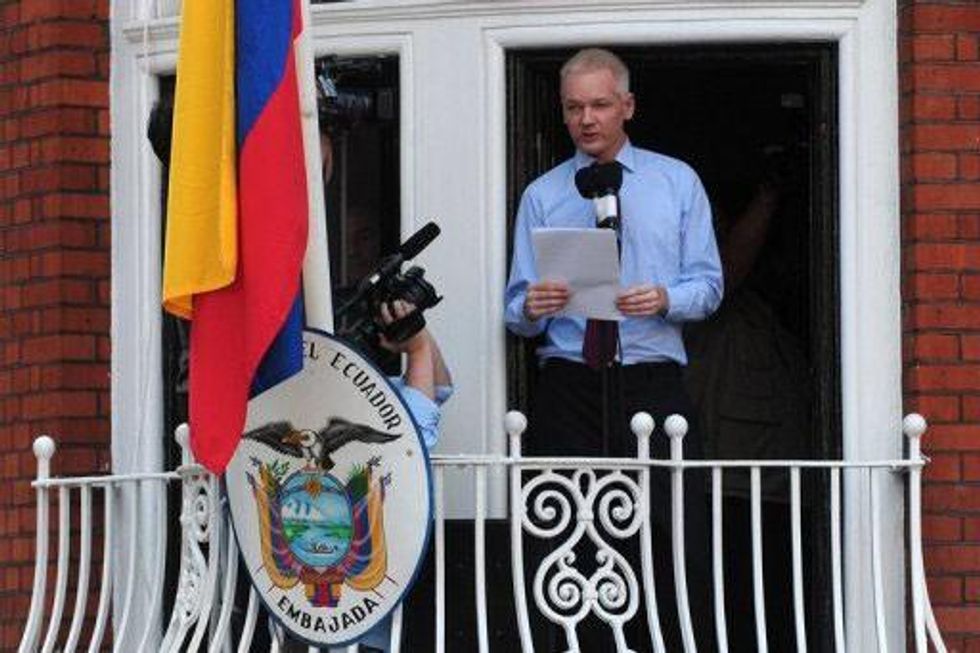

SUBSCRIBE TO OUR FREE NEWSLETTER
Daily news & progressive opinion—funded by the people, not the corporations—delivered straight to your inbox.
5
#000000
#FFFFFF
To donate by check, phone, or other method, see our More Ways to Give page.


Daily news & progressive opinion—funded by the people, not the corporations—delivered straight to your inbox.
Britain has withdrawn a threat to enter Ecuador's embassy in London to arrest WikiLeaks founder Julian Assange who has taken refuge there, President Rafael Correa said on Sunday, taking some of the heat out of the diplomatic standoff.
Speaking at a press conference on Sunday, Mr Correa said: "We consider this unfortunate incident over, after a grave diplomatic error by the British in which they said they would enter our embassy."
In a statement, Ecuador's government said it had received "a communication from the British Foreign Office which said that there was no threat to enter the embassy".
Ecuador was furious after the British government warned that it might try to seize Assange, who has been holed up in the building for more than two months.
Ecuador, which has granted Assange asylum, demanded that Britain's threat be retracted. The latest move should improve relations between Quito and London and allow more talks on Assange's fate to take place.
The Washington-based Organisation of American States had condemned Britain's threat, and South American foreign ministers strongly backed Correa's position that Britain's warning was unacceptable and could set a dangerous precedent.
Correa says he shares Assange's fears that if handed over to Sweden, he could then be extradited to the United States to face charges over WikiLeaks' 2010 publication of secret US cables.

Dear Common Dreams reader, The U.S. is on a fast track to authoritarianism like nothing I've ever seen. Meanwhile, corporate news outlets are utterly capitulating to Trump, twisting their coverage to avoid drawing his ire while lining up to stuff cash in his pockets. That's why I believe that Common Dreams is doing the best and most consequential reporting that we've ever done. Our small but mighty team is a progressive reporting powerhouse, covering the news every day that the corporate media never will. Our mission has always been simple: To inform. To inspire. And to ignite change for the common good. Now here's the key piece that I want all our readers to understand: None of this would be possible without your financial support. That's not just some fundraising cliche. It's the absolute and literal truth. We don't accept corporate advertising and never will. We don't have a paywall because we don't think people should be blocked from critical news based on their ability to pay. Everything we do is funded by the donations of readers like you. Will you donate now to help power the nonprofit, independent reporting of Common Dreams? Thank you for being a vital member of our community. Together, we can keep independent journalism alive when it’s needed most. - Craig Brown, Co-founder |
Britain has withdrawn a threat to enter Ecuador's embassy in London to arrest WikiLeaks founder Julian Assange who has taken refuge there, President Rafael Correa said on Sunday, taking some of the heat out of the diplomatic standoff.
Speaking at a press conference on Sunday, Mr Correa said: "We consider this unfortunate incident over, after a grave diplomatic error by the British in which they said they would enter our embassy."
In a statement, Ecuador's government said it had received "a communication from the British Foreign Office which said that there was no threat to enter the embassy".
Ecuador was furious after the British government warned that it might try to seize Assange, who has been holed up in the building for more than two months.
Ecuador, which has granted Assange asylum, demanded that Britain's threat be retracted. The latest move should improve relations between Quito and London and allow more talks on Assange's fate to take place.
The Washington-based Organisation of American States had condemned Britain's threat, and South American foreign ministers strongly backed Correa's position that Britain's warning was unacceptable and could set a dangerous precedent.
Correa says he shares Assange's fears that if handed over to Sweden, he could then be extradited to the United States to face charges over WikiLeaks' 2010 publication of secret US cables.

Britain has withdrawn a threat to enter Ecuador's embassy in London to arrest WikiLeaks founder Julian Assange who has taken refuge there, President Rafael Correa said on Sunday, taking some of the heat out of the diplomatic standoff.
Speaking at a press conference on Sunday, Mr Correa said: "We consider this unfortunate incident over, after a grave diplomatic error by the British in which they said they would enter our embassy."
In a statement, Ecuador's government said it had received "a communication from the British Foreign Office which said that there was no threat to enter the embassy".
Ecuador was furious after the British government warned that it might try to seize Assange, who has been holed up in the building for more than two months.
Ecuador, which has granted Assange asylum, demanded that Britain's threat be retracted. The latest move should improve relations between Quito and London and allow more talks on Assange's fate to take place.
The Washington-based Organisation of American States had condemned Britain's threat, and South American foreign ministers strongly backed Correa's position that Britain's warning was unacceptable and could set a dangerous precedent.
Correa says he shares Assange's fears that if handed over to Sweden, he could then be extradited to the United States to face charges over WikiLeaks' 2010 publication of secret US cables.
